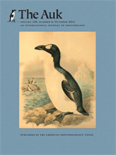
Ornithology
Scope & Guideline
Fostering Collaboration in Avian Research.
Introduction
Aims and Scopes
- Ecology and Behavior of Birds:
A central theme is the study of avian ecology, focusing on behavioral patterns, habitat use, and interactions with other species. This includes research on breeding phenology, foraging strategies, and social behaviors. - Conservation and Management:
The journal emphasizes the importance of avian conservation, reporting on the impacts of habitat loss, climate change, and other anthropogenic factors on bird populations and advocating for effective management strategies. - Evolutionary Biology and Phylogenetics:
Research on the evolutionary history of birds, including studies on speciation, hybridization, and phylogenetic relationships, is a prominent focus, providing insights into the mechanisms driving avian diversity. - Physiology and Morphology:
The journal includes studies on the physiological adaptations of birds, such as metabolic rates, reproductive strategies, and morphological traits, linking these aspects to ecological and evolutionary outcomes. - Migration and Movement Ecology:
Understanding migratory patterns and the ecological factors influencing migration strategies is a critical area of research, with studies employing tracking technologies and modeling approaches. - Taxonomy and Systematics:
The journal contributes to the field of avian taxonomy and systematics by publishing papers that refine species classifications and explore genetic diversity among bird populations.
Trending and Emerging
- Climate Change Impacts on Birds:
There is an increasing number of studies examining how climate change affects bird behavior, migration patterns, and breeding success. This trend reflects a broader recognition of the urgency to understand and mitigate the impacts of climate change on avian populations. - Conservation Genetics:
Research that integrates genetics into conservation efforts is gaining prominence. This includes studies on genetic diversity, hybridization, and the implications for species resilience and management. - Citizen Science and Data Utilization:
The use of citizen science data, such as eBird contributions, is trending. Researchers are leveraging large datasets from citizen observations to address questions about distribution, population trends, and ecological responses. - Technological Advances in Tracking and Monitoring:
Advancements in tracking technologies, such as satellite and geolocator studies, are becoming increasingly common. These studies provide new insights into migratory routes, habitat use, and behavioral ecology. - Interdisciplinary Approaches:
There is a noticeable trend towards interdisciplinary research that combines ornithology with fields such as ecology, climate science, and social sciences, reflecting a holistic approach to understanding avian issues in contemporary contexts.
Declining or Waning
- Traditional Taxonomy without Integrative Approaches:
There seems to be a waning interest in traditional taxonomic studies that do not incorporate genetic or ecological data. Recent publications increasingly favor integrative approaches that combine molecular data with morphological and ecological analyses. - Generalized Habitat Studies:
Research focusing on generalized habitat studies without specific ecological or conservation implications is less frequently published. More targeted studies examining specific habitat types or conservation issues are becoming the norm. - Behavioral Studies Lacking Ecological Context:
Papers that explore bird behavior without linking findings to ecological or evolutionary significance are appearing less often. There is a trend towards integrating behavioral studies with broader ecological frameworks.
Similar Journals

Avian Biology Research
Exploring the intricacies of bird biology.Avian Biology Research, published by SAGE PUBLICATIONS LTD, is a leading journal dedicated to advancing the study of avian species through high-quality, peer-reviewed research. With an ISSN of 1758-1559 and an E-ISSN of 1758-1567, this journal has established itself as a vital resource within the fields of Animal Science and Zoology, as well as Ecology, Evolution, Behavior, and Systematics. The journal is currently ranked Q3 in both categories according to the 2023 release of the category quartiles, and it contributes significantly to the global understanding of avian biology, including behavior, physiology, and conservation efforts. Positioned within the competitive landscape of the Scopus rankings, it finds itself amidst a diverse array of research, with medical and environmental implications. As an open-access journal, Avian Biology Research ensures greater accessibility to its contents, fostering disseminative opportunities for researchers, professionals, and students alike. With a publication window spanning from 2008 to 2024, it continues to be an invaluable platform for the dissemination and dialogue of avian research, thereby enlightening future inquiries and driving scientific advancements in this crucial area of biology.

MALIMBUS
Exploring the wonders of West African birdlife.MALIMBUS is a peer-reviewed journal published by the West African Ornithological Society, focusing on the study of avian biology and conservation. It aims to disseminate important research findings that contribute to the understanding of bird species, their habitats, and the challenges they face across West Africa and beyond. Although currently not available in an open-access format, the journal is an invaluable resource for ornithologists, ecologists, and industry professionals keen on advancing their understanding of avian science. Those engaged in research on bird migration, breeding behaviors, and conservation strategies will find MALIMBUS to be a vital platform for sharing innovative ideas and fostering collaborations. With its commitment to quality and rigorous review processes, MALIMBUS is an essential reference for anyone dedicated to studying and preserving avian diversity.
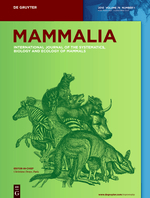
MAMMALIA
Championing excellence in mammalian research.MAMMALIA, published by Walter de Gruyter GmbH, is a renowned academic journal founded in 1936 that serves as a pivotal resource for researchers and professionals in the fields of Animal Science and Zoology as well as Ecology, Evolution, Behavior and Systematics. With an ISSN of 0025-1461 and an E-ISSN of 1864-1547, this journal has made significant contributions to mammalian research over the decades and continues to be pivotal in advancing knowledge within the scientific community. MAMMALIA is indexed in prominent databases, boasting a current Scopus ranking that places it within the upper echelons of the Q2 category in Animal Science and Zoology, and Q3 in Ecology, Evolution, Behavior and Systematics. Although it does not offer open access, the journal remains accessible through various academic institutions, ensuring that valuable research findings are disseminated widely. The journal’s commitment to quality and excellence in the study of mammals aligns with its high impact within the field, engaging a diverse readership that includes researchers, students, and professionals dedicated to furthering the understanding of mammalian biology. For more information, visit their office located at Genthiner Strasse 13, D-10785 Berlin, Germany.
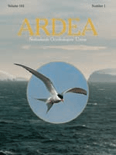
ARDEA
Pioneering research in avian studies and conservation.ARDEA, published by the Nederlandse Ornithologische Unie, is a prominent journal in the fields of Animal Science, Zoology, and Ecology. With its rich history spanning from 1981 to the present, ARDEA serves as a vital platform for researchers and professionals dedicated to avian studies and the ecological sciences. This quarterly journal is recognized in the Q3 category for both Animal Science and Ecology, as per the latest rankings, and maintains an impressive global standing within its subject areas. Although it operates without an open access model, the journal provides significant insights and contributions to the understanding of bird biology, conservation, and evolution. Researchers and students seeking to advance their knowledge in ornithology and related fields will find ARDEA to be an indispensable resource, promoting high-quality research and fostering academic collaboration.

JOURNAL OF ORNITHOLOGY
Innovating Research for Bird PreservationJOURNAL OF ORNITHOLOGY, published by Springer Heidelberg, is a leading international journal dedicated to the study of birds and their conservation. With an ISSN of 2193-7192 and an E-ISSN of 2193-7206, this journal serves as a crucial platform for disseminating innovative research focused on avian biology, ecology, and behavior, making significant contributions to the fields of Agricultural and Biological Sciences and Animal Science and Zoology, where it holds a commendable rank of #156 out of 490 in Scopus. Established from 2004 and continuing through 2024, the journal strives not only to advance academic scholarship but also to inform practical conservation efforts globally. While currently not open access, it remains a vital resource for researchers, professionals, and students seeking high-quality studies and findings that influence the understanding and preservation of bird species. The journal's commitment to excellence in science highlights its importance in ornithological research, offering insights that are both profound and actionable.

CRUSTACEANA
Connecting Researchers to Aquatic Science InnovationsCRUSTACEANA, published by BRILL, stands as a pivotal resource in the field of Animal Science and Zoology as well as Aquatic Science, with a focus on advancing the understanding of crustacean biology, ecology, and evolution. With an ISSN of 0011-216X and an E-ISSN of 1568-5403, this journal has been curating significant research since its inception in 1960 and continues to contribute scholarly knowledge up to 2024. Although it operates without an Open Access option, CRUSTACEANA holds a commendable Q3 ranking in both the Animal Science and Aquatic Science categories for 2023. Furthermore, it consistently provides insightful articles that enrich the academic dialogue surrounding aquatic ecosystems, making it a valuable platform for researchers, professionals, and students alike.
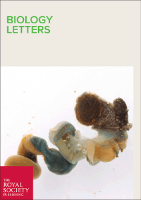
Biology Letters
Bridging disciplines to elevate the field of biological sciences.Biology Letters, published by the esteemed Royal Society, stands at the forefront of research in the field of biological sciences, with a strong emphasis on innovative studies that bridge gaps across disciplines. Since its inception in 2005, the journal has garnered significant recognition, achieving a remarkable Q1 ranking in Agricultural and Biological Sciences (miscellaneous) and a percentile of 88th in the same category, according to Scopus rankings. Released in the United Kingdom, the journal offers a platform for authors to share concise research findings and theoretical perspectives that contribute meaningfully to the advancement of biological inquiry. Although not open access, the journal remains highly regarded in the academic community for its rigorous peer-review process and impactful content, making it an invaluable resource for researchers, professionals, and students dedicated to exploring the complexities of biology. With an ongoing commitment to excellence, Biology Letters continues to shape the future of biological sciences.
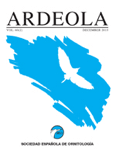
Ardeola-International Journal of Ornithology
Exploring the Wings of KnowledgeArdeola - International Journal of Ornithology, published by the SOCIEDAD ESPAÑOLA DE ORNITOLOGÍA, serves as a vital platform for the dissemination of research in the field of avian studies. With a history dating back to 1980, this esteemed journal has cultivated a reputation for high-quality research, achieving a notable Q2 category ranking in Animal Science and Zoology as well as in Ecology, Evolution, Behavior, and Systematics as of 2023. While primarily based in Spain, Ardeola caters to a global audience, providing essential insights into ornithology through rigorously peer-reviewed articles. The journal does not currently operate under an open-access model, which underscores the significance of institutional subscriptions and the importance of supporting academic publishing. Researchers, professionals, and students engaged in avian ecology will find Ardeola indispensable for accessing impactful studies that advance our understanding of bird populations, behaviors, and conservation issues. With its accessibility and continuing commitment to excellence, Ardeola plays a crucial role in fostering knowledge and promoting dialogue in the ornithological community.

ORNIS FENNICA
Championing Biodiversity Through Bird ResearchORNIS FENNICA, published by BirdLife Finland, is a seminal journal dedicated to the field of ornithology and avian ecology. Established in Finland, this journal has been a vital resource for researchers, professionals, and students since its inception, evolving through converged publication periods from 1979 to 1985 and again from 1991 to the present. ORNIS FENNICA holds a Q2 category ranking in Animal Science and Zoology for 2023, indicating its significant influence and reputation within the academic community, as reflected in its Scopus ranking of 242 out of 490 in its field. The journal aims to promote the study of birds, encompassing aspects such as behavior, conservation, and biodiversity, thus serving as a crucial platform for disseminating innovative research findings. Although it is not open access, ORNIS FENNICA remains committed to advancing ornithological knowledge and supporting the scientific community's efforts to understand and protect avian species. For those invested in the nuances of bird research, this journal offers an invaluable repository of scholarly articles, reviews, and insights.

ZOOLOGICHESKY ZHURNAL
Delving into the dynamics of ecosystems and species behavior.Zoologichesky Zhurnal, a prominent journal in the field of Ecology, Evolution, Behavior and Systematics, has been a vital publication since its inception in 1950. Published by MAIK Nauka-Interperiodica in the Russian Federation, this journal has established a notable reputation in disseminating scientific research and advancing knowledge in zoology. With its coverage spanning from 1950 to 2023, and a specific convergent focus during 1982-1983, this journal contributes significantly to the ecological and evolutionary sciences, even though it currently holds a Q4 classification in the 2023 category quartiles, indicating its niche positioning among peers. Researchers and students engaged in the study of biological sciences, particularly those interested in the dynamics of ecosystems, behavior of species, and evolutionary processes, will find valuable insights and original research articles within its pages. While access to this esteemed journal is not open, it remains an essential resource for those seeking to deepen their understanding of zoological sciences.